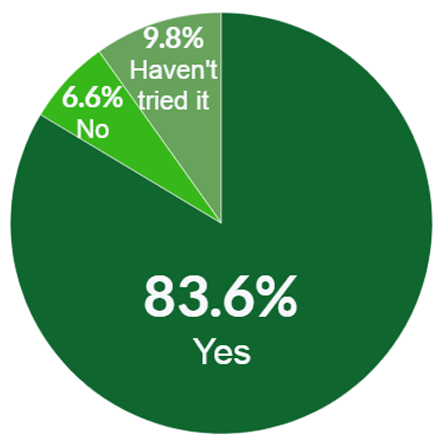Just how healthy are your muscles and joints?
Answer our questions and find out if your flexibility is compromised.
Find out how flexible you areIn a recent A.Vogel survey, 26.1% of people said that their joint pain was worse in the morning. Given that this seems to be a relatively big problem, I thought it would be useful to take a look at the issue in a little more depth. There are a few reasons why the joints hurt more in the morning so let's see what these are.
There are lots of different reasons for joint pain, from conditions like arthritis, to injuries and gout. For many people, this pain is worse in the morning.
To understand more about this problem, this blog looks at:
Often, a combination of a variety of factors can contribute to joint pain in the morning, but here are four key issues to consider.
1. Lack of movement
Joint pain, particularly arthritic pain, tends to be worse in the morning due to the fact that we move very little during sleeping hours. Movement keeps the joints working smoothly, whilst being sedentary can exacerbate pain and stiffness. This discomfort usually wears off about 30 minutes after waking, once you start moving about again, but it may take longer in cases of rheumatoid arthritis.
Pain can also be worse when sleep deprived1, therefore, if you haven't had a good night's sleep, this could explain why your joint pain is worse in the morning. As pain often makes it difficult to get good sleep in the first place, it can be a bit of a vicious cycle.
It's key to remember that sleep is healing, and if you're in pain there is really almost no better medicine than rest.
Another reason for bad joint pain in the morning may be linked to your sleeping position. Both an old mattress or unlevel pillow, for example, can influence the severity of pain.
Finally, what you eat and drink in the hours before sleep can make pain worse. The likes of caffeine and alcohol, for example, are pro-inflammatory. Sugar can also be problematic in this regard so, if you've been snacking on chocolate and biscuits whilst watching television in the evening, it may very well cause your joints problems thereafter.
When going to bed, set yourself up for a less painful morning with a few simple steps.
A warm bath helps to relax the muscles and reduce the pressure on joints, particularly the knee joints, as the water allows them to feel supported. Heat can also reduce swelling and inflammation, as well as boosting overall circulation.
As an added bonus, studies show that a warm bath can increase sleepiness at bed time and encourage deep sleep.2 Therefore, by improving sleep quality, a warm bath could impact your joint pain which can be made worse due to poor sleep.
Like a bath, the heat from a hot water bottle can help to reduce pain and ease swelling. Warming bean bags are also available and have a similar effect. These can be popped in the microwave and then wrapped around the offending joint.
I would recommend heating up your hot water bottle or beanbag an hour or so before bed, so that the effects kick in before you put the lights out to go to sleep.
We're all going to toss and turn during the night, but starting off in a good sleeping position is at least a good habit to keep.
The key thing to remember here is that any painful joints need a little bit of extra support. If you tend to sleep on your side and your knees cause issues, pop a pillow between your legs for extra support. If you tend to lie on your back, putting a pillow under your knees will help to reduce the pressure on both the knees and back.
Sleeping on your front is best avoided since the neck has to twist at an unnatural angle in order to breathe, and the inside organs can get a little squished. This is more likely to contribute to digestive issues, which you certainly don't want on top of joint pain!
If you are on pain-relieving medication, sometimes this can wear off in the middle of the night. Therefore, it is worth talking with your doctor about when it is best to take your medication in order to sleep better through the night and avoid more severe joint pain in the morning.
Finally, it is a good idea to stretch before going to bed, as well as first thing in the morning. This'll loosen off the joints, helping to reduce tension and pain.
In order to stretch safely, check out some of our easy videos over on the Get Active hub.
1 https://www.ncbi.nlm.nih.gov/pmc/articles/PMC3296796/
2 https://www.ncbi.nlm.nih.gov/pubmed/2578367

 Looking for a treatment to relieve pain in conditions such as muscle aches or pains, stiffness, rheumatic pain or after sporting injuries?
Looking for a treatment to relieve pain in conditions such as muscle aches or pains, stiffness, rheumatic pain or after sporting injuries?
Buy now from your local store.
“Excellent product, really helps with pain relief.”![]()
To find local independent stores in your area that sell Atrogel Arnica gel, simply type your postcode below.

Answer our questions and find out if your flexibility is compromised.
Find out how flexible you areAs the A. Vogel Muscles and Joints advisor, I recommend Atrogel® for the effective relief from aches and pains.
Learn moreYour gut could be to blame for your joint pain! New studies have found potential links between the 'bad' bacteria in the digestive tracts and certain types of joint pain!
Is your gut to blame?Discover the story of Alfred VogelNature is just about the best thing we’ve got!